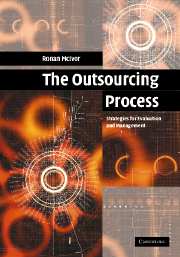Book contents
- Frontmatter
- Contents
- List of figures
- List of tables
- List of illustrations
- Acknowledgements
- 1 Introduction
- 2 The trend towards outsourcing
- 3 Theoretical influences on outsourcing
- 4 The outsourcing process: a framework for evaluation and management
- 5 Determining the current boundary of the organisation
- 6 Activity importance analysis
- 7 Capability analysis
- 8 An analysis of the strategic sourcing options
- 9 Developing the relationship strategy
- 10 Establish, manage and evaluate the relationship
- 11 Case study – outsourcing experiences at Telco
- 12 Conclusions
- Index
- References
10 - Establish, manage and evaluate the relationship
Published online by Cambridge University Press: 21 August 2009
- Frontmatter
- Contents
- List of figures
- List of tables
- List of illustrations
- Acknowledgements
- 1 Introduction
- 2 The trend towards outsourcing
- 3 Theoretical influences on outsourcing
- 4 The outsourcing process: a framework for evaluation and management
- 5 Determining the current boundary of the organisation
- 6 Activity importance analysis
- 7 Capability analysis
- 8 An analysis of the strategic sourcing options
- 9 Developing the relationship strategy
- 10 Establish, manage and evaluate the relationship
- 11 Case study – outsourcing experiences at Telco
- 12 Conclusions
- Index
- References
Summary
Introduction
Many organisations underestimate the effort involved in implementing an outsourcing strategy. This lack of awareness can range from the potential pitfalls that can arise to the level of resource involved in managing the outsourcing process. For example, there is a common perception that once an activity is outsourced that responsibility for the outsourced activity rests solely with the supplier. Many organisations also lack the skills to implement an effective outsourcing strategy. Managing an external supplier requires a different set of skills than those associated with managing an internal business function. For example, the manager responsible for managing the activity when it was performed in-house may not have the range of skills or experience to manage an external provider of the activity. This lack of awareness of the effort involved in managing external relationships can be particularly serious in the outsourcing of critical activities. Often the buyer will adopt a collaborative relationship with the supplier for a critical activity. However, developing collaborative relationships across organisational boundaries presents organisations with considerable challenges from an organisation change perspective. For example, when developing collaborative relationships, a culture of confrontation can stifle the intentions of the buyer in its attempts to develop a close collaborative relationship with suppliers. In pursuing collaborative relationships, the buyer has to consider a number of issues including the adoption of an integrated approach to the management of strategic change, the pivotal role of senior managers as facilitators of change, and the involvement of those most affected by the change.
- Type
- Chapter
- Information
- The Outsourcing ProcessStrategies for Evaluation and Management, pp. 245 - 275Publisher: Cambridge University PressPrint publication year: 2005



